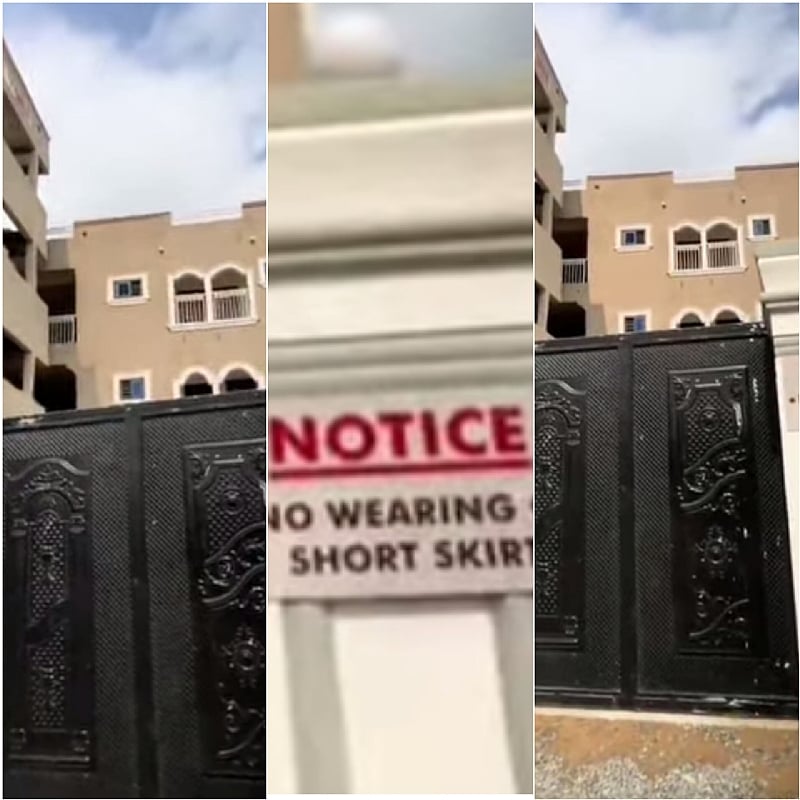The imposition of a dress code banning short skirts and “hookup” activities in a Kasoa apartment complex has ignited a fiery debate about the boundaries of landlord authority, personal freedoms, and societal norms. The landlord, whose identity remains undisclosed, justified the restrictions as necessary to maintain “moral discipline and respect” within the premises. This rationale, however, has been met with strong opposition from tenants and legal experts who argue it infringes upon basic rights and constitutes an overreach of landlord power. The incident underscores a growing tension between individual liberties and perceived community standards, raising questions about the appropriate balance between personal choices and collective responsibility.
The implementation of the ban has reportedly been communicated through both verbal announcements and written notices posted at the building’s entrance. This seemingly informal approach further complicates the issue, raising concerns about the legality and enforceability of such regulations. While some tenants have expressed support for the landlord’s actions, viewing it as a justifiable measure to prevent disruptive behavior and maintain a respectable environment, many, particularly female occupants, have voiced their displeasure. They argue that the restriction on clothing choices is discriminatory, outdated, and an unwarranted intrusion into their personal lives. This division of opinion among residents highlights the complex interplay of factors at play, including generational differences, cultural values, and individual interpretations of decency.
Legal and human rights advocates have firmly condemned the landlord’s actions, characterizing them as a clear violation of fundamental rights guaranteed under the Ghanaian constitution. They emphasize that while landlords have the right to establish reasonable house rules to ensure the peaceful coexistence of tenants and the upkeep of the property, these rules cannot infringe upon basic freedoms such as the right to personal expression and freedom of association. Furthermore, the ambiguous nature of the “hookup” ban raises concerns about its potential for discriminatory enforcement and the subjective interpretation of what constitutes such activity. The lack of clear legal definitions and the potential for misuse underscores the problematic nature of the imposed restrictions.
The incident has sparked wider discussion about the prevalence of moral policing within Ghanaian society. While some applaud the landlord for taking a stand against perceived moral decay, others express concern about the creeping encroachment on individual liberties in the name of preserving traditional values. Critics argue that such actions set a dangerous precedent, potentially empowering individuals and groups to impose their personal moral codes on others. This raises fundamental questions about the role of community standards in regulating individual behavior and the delicate balance between respecting cultural norms and protecting fundamental rights.
The Kasoa apartment controversy highlights the complexities of landlord-tenant relationships in Ghana. While landlords have a legitimate interest in maintaining order and protecting their property, their authority is not absolute. The law provides tenants with certain protections, including the right to quiet enjoyment of their premises and freedom from unreasonable interference. The imposition of a dress code and restrictions on social activities, particularly when based on subjective moral judgments, pushes the boundaries of acceptable landlord conduct. It necessitates a closer examination of existing tenancy laws and the need for clearer guidelines to protect tenants from arbitrary and discriminatory practices.
The debate surrounding the Kasoa apartment ban extends beyond the immediate confines of the building. It touches upon broader societal questions about the limits of individual freedom, the role of law in regulating private behavior, and the balance between individual rights and community expectations. The incident serves as a cautionary tale, highlighting the need for open dialogue and a nuanced understanding of the complex interplay between personal freedoms, social responsibility, and the evolving norms that govern our interactions within shared spaces. It calls for a reaffirmation of fundamental rights and a critical examination of the justifications used to curtail those rights in the name of morality or community standards.


